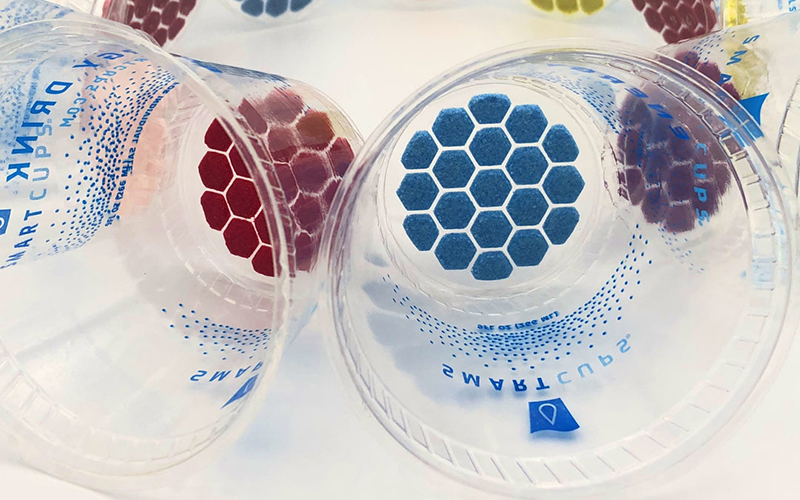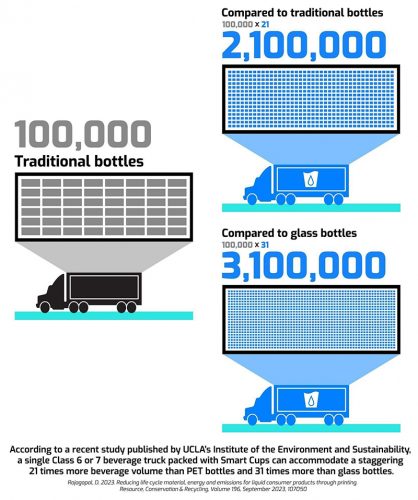UCLA study highlights Smart Cups’ revolutionary technology reducing environmental impact of liquid consumer products
Smart Cups, a pioneering sustainability-driven technology company behind innovative ingredient printing announced the publication of a new research study …


Smart Cups, a pioneering sustainability-driven technology company behind innovative ingredient printing announced the publication of a new research study in the esteemed journal Resource, Conservation & Recycling. The study, titled “Reducing life cycle material, energy and emissions for liquid consumer products through printing,” conducted by UCLA’s Institute of the Environment and Sustainability and authored by Professor Deepak Rajagopal, has brought to light the remarkable potential of Smart Cups Technology in transforming the consumer-packaged goods industry and contributing to a greener future.
“The technology that Smart Cups has pioneered has the potential to drastically reduce the environmental burden of beverages and several other liquid products through a reduction in total packaging and transportation across the product lifecycle,” said Professor Deepak Rajagopal. “The implications of this research extend beyond the consumer-packaged goods industry. Major companies, including industry giants like Pepsi, Coke, and Proctor and Gamble, could benefit from Smart Cups’ ground-breaking approach to delivering products more sustainably. Embracing this innovation can help such large corporations achieve sustainability goals and become leaders in eco-friendly practices”.
The study focuses on the profound environmental benefits of Smart Cups Technology which enables direct printing of consumer product ingredients onto surfaces, leading to substantial reductions in packaging materials, energy consumption, carbon emissions and overall environmental burdens. The study unveils the far-reaching implications for not just the beverage industry, but also the consumer-packaged goods industry as whole, promising to revolutionise distribution logistics and minimise environmental impact.
Key highlights from the study include:
- The study’s findings show that a single Class 6 or 7 beverage truck packed with Smart Cups can accommodate a staggering 21 times more beverage volume than PET bottles and 31 times than glass bottles.
- Smart Cups printed on PLA cups, when paired with tap water, result in 20 % less packaging materials than aluminum, 40 % less than plastic, and an impressive 90 % less than glass-based packaging.
- This reduction in packaging translates into a 23 % to 48 % decrease in lifecycle primary energy and a 40 % to 57 % decrease in global warming potential. With biogenic carbon credit for landfilled PLA, the reductions reach an impressive 50 % to 70 %.
Smart Cups Technology is the first of its kind, revolutionising the delivery of liquid consumer products and minimising their environmental impact. This research not only amplifies the positive impact Smart Cups Technology can have on the world but also strengthens the validation of its significant benefits by reshaping the consumer products industry. By eliminating the need for bulky packaging materials, such as PET bottles or glass containers, Smart Cups optimise beverage payload, allowing for substantially higher volumes to be transported within the same truck weight limits. This breakthrough not only enhances logistical efficiency but also reduces the carbon footprint associated with transportation, as fewer trucks are required to transport the same amount of beverage.
The implications of this research extend far beyond the immediate benefits of increased payload capacity. By revolutionizing beverage transportation, Smart Cups are poised to transform the entire industry landscape, introducing a new era of sustainability and efficiency. With the potential to streamline distribution networks and reduce reliance on fossil fuels, Smart Cups offer a visionary solution to the pressing environmental challenges faced by the beverage sector.
The UCLA study underscores the profound impact of Smart Cups on beverage transportation, highlighting the unparalleled payload capacity that this innovative packaging technology provides. As industry leaders and consumers alike seek more sustainable and efficient solutions, Smart Cups stands at the forefront of a transformative movement. The researchers at UCLA are confident that their findings will inspire further exploration and adoption of Smart Cups within the beverage industry, ultimately leading to a greener, more efficient future.
To access the full article and learn more about the study, please visit: https://www.sciencedirect.com/science/article/abs/pii/S0921344923001866?dgcid=author









